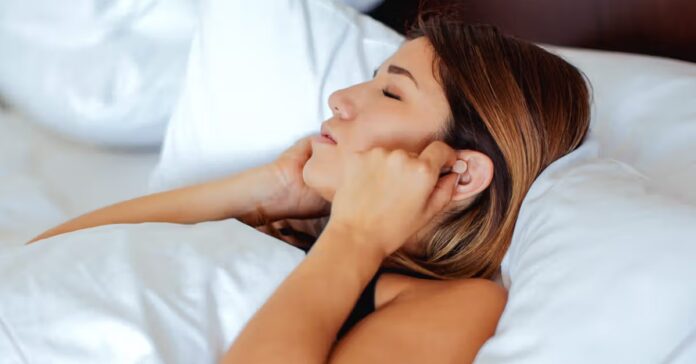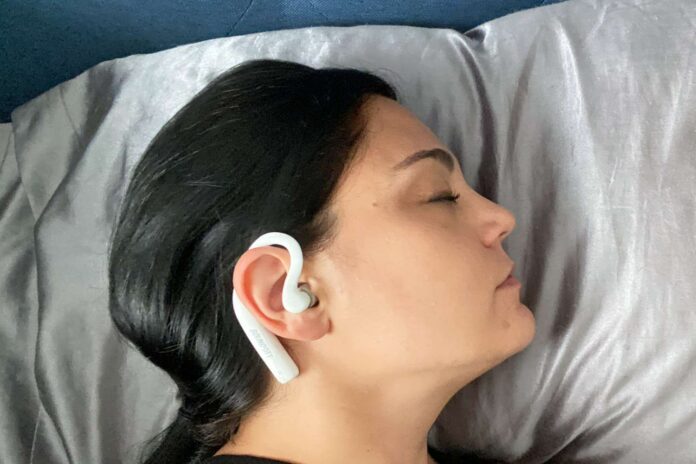In a world constantly buzzing with noise, from the hum of city traffic to the chatter of electronic devices, finding peace for a good night’s sleep can be a challenge. This blog post delves into the use of ear plugs as a solution for uninterrupted slumber, exploring the benefits and drawbacks of this simple yet effective tool.
Whether you’re a light sleeper, a night-shift worker, or someone just seeking a serene night, understanding the role of ear plugs in enhancing sleep quality is essential.
The Benefits of Using Ear Plugs for Sleep

Enhanced Sleep Quality
The primary benefit of using them for sleep is significant quality improvement. Blocking out external blusters can lead to a deeper, more restful sleep. Studies have shown that uninterrupted sleep is crucial for the body’s ability to repair and rejuvenate itself.
In environments where din is inevitable, such as in urban areas or households with varying schedules, earplugs can be a game-changer. They help in maintaining the continuity of cycles, which is essential for cognitive functions like memory consolidation and learning.
Health and Well-being
The link between good sleep and overall health is well-established. By using earplugs to enhance quality, individuals can experience a range of health benefits. This includes reduced stress levels, improved mood, and better mental health.
Consistently good sleep, facilitated by ear plugs such as Hearprotek Sleeping Earplugs, can also lower the risk of chronic health issues such as heart disease, obesity, and diabetes. This underscores the importance of an undisturbed environment for maintaining physical and mental well-being. By using specifically designed ear plugs like Hearprotek, which are tailored for sleep, individuals can significantly enhance the quality of their rest, thereby contributing to their overall health.
Potential Drawbacks of Usage
Physical Discomfort and Safety Concerns
One of the primary concerns with using them is the potential for physical discomfort. Some individuals may find them uncomfortable, especially when used for prolonged periods. This discomfort can range from minor irritation to more severe issues like ear infections or impacted earwax.
Safety concerns also arise when using earplugs, particularly in situations where being able to hear alarms or emergency signals is crucial. It’s important to consider these factors and choose ones that provide a balance between bluster reduction and safety.
Dependency and Overuse
Another potential drawback is the development of a dependency on one for sleep. Over time, individuals might find it increasingly difficult to nap without them, which can be problematic in situations where they are not available or appropriate.
Additionally, prolonged and improper use of earplugs can lead to health issues such as ear infections or impacted earwax. It’s essential to follow proper hygiene practices and use earplugs responsibly to avoid such complications.
Choosing the Right Ear Plugs for Sleep

Types and Materials
When selecting ear plugs for rest, it’s crucial to consider the different types and materials available. The most common types include foam ear plugs, silicone plugs, and wax plugs, each offering different levels of comfort and noise reduction.
Considerations for Comfort and Effectiveness
Comfort is a key factor in choosing them. It’s important to select a type that fits well and doesn’t cause irritation. Additionally, the effectiveness of the earplugs in blocking noise should be considered, keeping in mind the specific needs of the user.
For instance, individuals living in extremely noisy environments might require earplugs with a higher din reduction rating. On the other hand, those who need to hear some level of sound for safety reasons might opt for earplugs that reduce noise without completely blocking it.
Understanding the Impact of Noise on Sleep
How Noise Affects Sleep Patterns
Noise has a profound impact on the quality of nap. It can disrupt the natural cycle, leading to frequent awakenings and a shift from deep sleep to lighter stages. This disruption can have a cascading effect, impacting not just the quantity but also its restorative quality.
The impact of noise on sleep varies from person to person. Some may be more sensitive to environmental noises, such as traffic sounds or a partner’s snoring, while others might find even the faintest noises disruptive. Understanding one’s sensitivity to din is crucial in determining the need for them or other noise-mitigating solutions.
Long-Term Effects of Noise-Induced Sleep Disturbance
Chronic exposure to noise during sleep doesn’t just lead to short-term fatigue; it can have long-term health implications. Studies have linked long-term bluster exposure during rest to increased risks of high blood pressure, heart disease, and mental health disorders like anxiety and depression.
These long-term effects highlight the importance of creating a quiet environment. For those living in noisy areas, earplugs become not just a convenience but a necessity for maintaining long-term health and well-being.
Alternatives to Ear Plugs for Noise-Free Sleep

Other Noise-Reduction Strategies
While they are a popular choice for blocking out noise, other strategies can be effective. Machines, for example, can mask disruptive environmental sounds with a soothing, consistent sound. Another option is soundproofing the bedroom, which can range from simple solutions like heavy curtains to more complex measures like acoustic panels.
Lifestyle changes can also play a role in mitigating noise. Adjusting schedules to avoid the noisiest times, using relaxing music or guided meditations to mask background noise, and addressing sources of racket within the home can all contribute to a quieter environment.
When to Consider Professional Help
In cases where disturbances are severe or persistent, it might be wise to seek professional help. A specialist can provide a comprehensive evaluation and recommend tailored solutions, which may include behavioral therapy, sound therapy, or medical interventions.
Conclusion: Balancing the Pros and Cons
In conclusion, while resting with earplugs offers numerous benefits in terms of enhanced quality and overall health, it’s important to be aware of the potential drawbacks. The key is to choose the right type of earplugs, use them responsibly, and maintain proper ear hygiene.
By carefully weighing the pros and cons, individuals can make informed decisions about using earplugs for noise-free sleep, leading to better rest and improved well-being. Remember, the goal is not just to block out noise, but to achieve a balanced and healthy environment.









